Stories of service from around the world
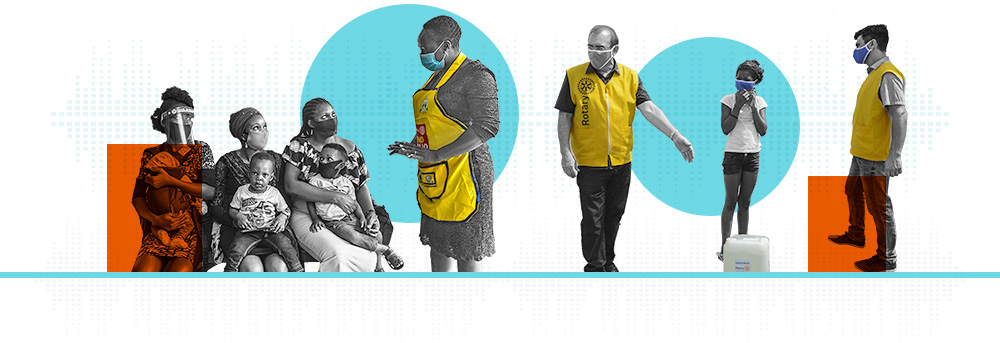
Disability as a driving force for success
By Badara Dafé, Rotary Club of Dakar Soleil, Senegal
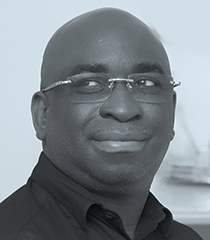
Polio is a very coercive and disabling disease. But as a polio survivor, I’ve been able to draw extra motivation from the disabilities the disease left me with. It gave me a taste for effort and hard work. I was able to turn what seemed like a threat into an opportunity.
I contracted polio at the age of one in Dakar, Senegal. The fever lasted for days, and paralysis set in, especially on the right side of my legs. Although the doctors initially thought I had malaria, it ended up being polio.
After several operations and countless sessions of functional re-education, I was able to walk on crutches. It didn’t stop me from playing soccer with my friends, going to the beach, and so on. Overall, I have excellent memories of my childhood.
Even so, I was aware of my reduced mobility and that’s why I concentrated on my studies. I quickly realized that I had to work harder than able-bodied people to succeed. I was able to do my classes without any difficulty, with the precious help of my schoolmaster, who would let me go 10 minutes before the other pupils so that he wouldn’t knock me over.
I studied mathematics and computer science in Senegal, then continued my studies at the Université Paris Saclay in Orsay, where I graduated with a degree in computer science, specializing in databases. Having started my career in Paris, I worked for a number of major French companies, before returning to Senegal in 2000 to join the Central Bank of West African States (BCEAO). I served there for 21 years before recently setting up my own business consultancy firm.
I have been thankful for the ability to study and work and earn a living with dignity, and for a mother who helped me face every obstacle and accompanied me with tireless dedication. My family and all those around me have played, and continue to play, a vital role. Those of us with disabilities face difficulties of various kinds: accessibility, apprehension, stigmatization, and isolation. But anything is possible with a strong mind and an understanding, committed environment.
I was introduced to Rotary in 2013 by a friend who was a doctor and member of the Rotary Club of Dakar Soleil. He explained Rotary’s polio eradication efforts. I immediately said to myself that I wanted to be part of this noble effort. Today, I’m president of my club and very much involved in the Senegal Polio Committee.
Polio has no cure but is preventable by vaccine. As a Rotarian and polio survivor, I urge you to join my fellow Rotary members and I in our continued effort to eradicate this disease. No child should ever have to suffer from its effects again.
Learn more about Rotary’s polio eradication initiative and how you can help
How art can channel diverse experiences

In darkness, the artwork develops an unforeseen three-dimensionality, and a punk head appears like a whole universe.
By Meral Alma, Rotary Club of Düsseldorf-Schlossturm, Germany
I was born in Germany and raised amidst a tapestry of diverse cultures – Turkish, Arabic, and German. Today, I view these varied cultural imprints and experiences as a profound treasure.
It’s akin to a grand mansion with myriad windows that open possibilities to perceive situations and people from different angles. The remarkable spectrum of attitudes and experiences has brought me to a profound understanding that in life, the pursuit of recognition or acceptance should never be tethered to conformity or submission. Instead, one must forge one’s own perspective and chart a personal path towards liberation and fulfilment, even if it entails enduring profound challenges spanning years or even decades.
Our world is an intricately interconnected web, where countless threads bind everything together. However, many of these connections remain hidden to our social bubbles, bombarded by information and disinformation, while boundaries shift, and value systems erode. It’s crucial to firmly position oneself and form an independent opinion.
Within Rotary, I have consistently encountered genuine, engaging, and dedicated individuals. The concept of uniting individuals from diverse backgrounds and professions to facilitate the exchange of ideas, coupled with the humanitarian essence of Rotary, resonates with the values instilled in me. Rotary serves as a platform for exchanging ideas, examining circumstances from diverse viewpoints, and taking tangible actions that embody our values rather than merely discussing them.
The painted transcript of perceived reality
I am a painter who creates expansive worlds on canvases stretching up to 16 meters tall. Within these painted realms, figures, environments, and stories come alive, perpetually in motion and undergoing transformative journeys. They capture raw emotions, delicate beauty, and occasional harshness inherent in these experiences.
Life, a perpetual state of transformation, offers a profound chance to decisively shape our own evolution and that of the world. As an artist, I translate the world and the impressions I carry within me into the studio, pouring them onto the canvas. The force behind each stroke, the confident precision, and the dynamic interplay of colours and forms – these elements later become palpable, evoking a response within the viewer.
My approach to painting prioritizes liveliness and expressiveness over precise replication. It’s about accentuating unique traits, seizing moments and emotions, and then channelling them onto the canvas for the viewer’s consumption. By doing so, I aim to render intangible ideas into something concrete and relatable.
In my artwork, I frequently depict the punk as a singular character. To me, this symbol represents not the historical rebellion against societal norms, but an invitation to forge a personal path. It embodies the courage to uphold one’s values and convictions, refusing to live a life driven by the need for external validation or fear of potential drawbacks. The emergence of the punk figure in my works several years ago was a revelation. With the canvas lying horizontally before me, I let the paint flow freely, gradually outlining the contours of the figure with bold, determined brushstrokes. Layer by layer, the mysterious form took shape, unveiling its hidden essence beneath the evolving tapestry of paint.
But my intention extended beyond mere representation. In our interactions with others, and even within ourselves, numerous motives, traits, and emotions often lay concealed, perceptible only through subtle sensations. To capture this profound encounter within my artwork, the punk heads bear an extra visual layer – an empowered alter ego that surfaces solely in darkness, rendering tangible the intangible depths of our being.
See more of Alma’s paintings on this Rotary Instagram post
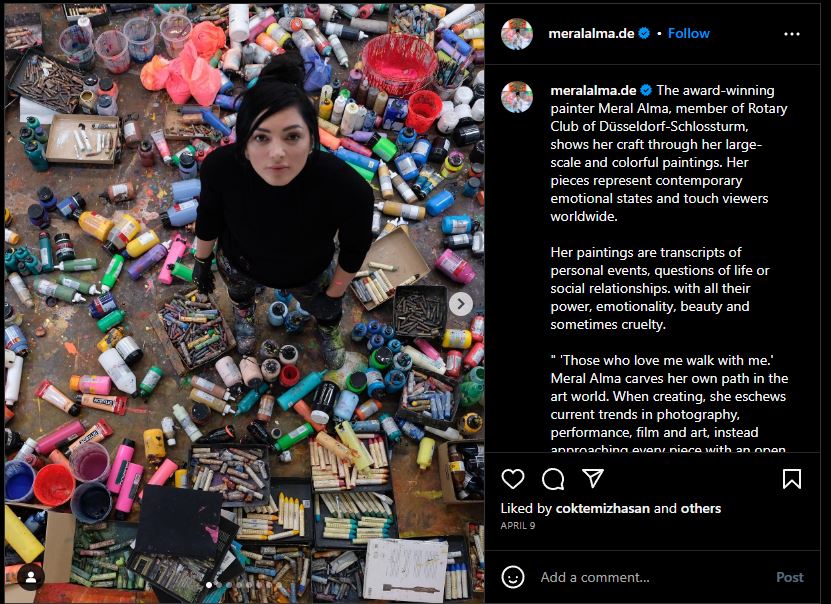
Milestone for Rotary club in South Africa
By Ifechukwude Rex Omameh, 2023-24 president of the Rotary Club of Blouberg, South Africa
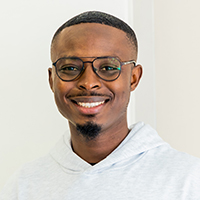
In July, I became the youngest president in the history of my Rotary club, and the first president of color.
It was while I was sitting in the audience at the Rotary People of Action: Champions of Inclusion concert in Cape Town that I realized the significance of this. I had a conversation with Rotary General Secretary and CEO John Hewko, who encouraged me to share my story. I’m excited about what my presidency could mean to the future of my club, my district, and Rotary in South Africa.
I’ve always advocated for transition in Rotary. I joined the Rotary family in 2007 as an Interactor in Nigeria, where I grew up. I didn’t even know it was called Interact. I just volunteered at Rotary projects, and we would meet informally to plan our own activities.
I joined Rotaract when I began college in Nigeria. When I moved to Cape Town to further my education, I became a member of the Rotaract Club of Blouberg. Four years later, in 2020, I joined the Rotary Club of Blouberg. I was the club’s first dual member of Rotary and Rotaract, the same year Rotary International elevated Rotaract to equal status with Rotary.
Club history
Blouberg Rotary has a rich history. Chartered in 1986, the club has hosted well-known guest speakers like former president F.W. de Klerk and performer Pieter-Dirk Uys. I’m honored to be chosen to lead a club with projects that have run for decades. I’m even more honored to lead a Rotary club in South Africa, where no person of color has led a club in more than 35 years.
My transition from Rotaract to Rotary wasn’t entirely smooth. I was the youngest member of my Rotary club. Within a year of joining, I was approached by fellow Rotarians asking me to run for president because the club needed a “breath of fresh air” and good leadership.
I was almost certain that neither myself nor my club were ready for my leadership. The difference in age was dramatic. The average age of our club members then was over 50 years old. Similarly, while South Africa is 80.1% black, at the time I joined, our club was 2.7% black. I accepted the nomination but knew I didn’t stand a chance.
Many firsts
But I strongly believe that humanity should be our race and love should be our religion. There are so many Rotarians in South Africa and the world who share this vision. As a Rotarian, I express service above self through my favorite areas of focus: ending hunger, ending polio, basic education and literacy, and water and sanitation. I host our district’s annual polio fundraising event and our sandwich drive distributes more than 28,000 sandwiches to those who are hungry in collaboration with partners and other Rotaract and Interact clubs.
I was not selected president in 2020, but I was humbled to receive multiple nominations to run again for the 2023-24 year. It’s a moment of many “firsts.” Most importantly, it’s a time for growing in diversity and equity. The Blouberg Rotary Club has been active in embracing DEI, and I am so proud to call them not just fellow Rotarians, but family.
At the Champions of Inclusion event, I saw what diversity and integration can look like in our service clubs around the world. I was inspired by the speech of Andrè Hadley Marria. I look forward to serving my club as its youngest president, and watching Rotary grow in South Africa and elsewhere.
Collaboration helps Ugandan women out of extreme poverty
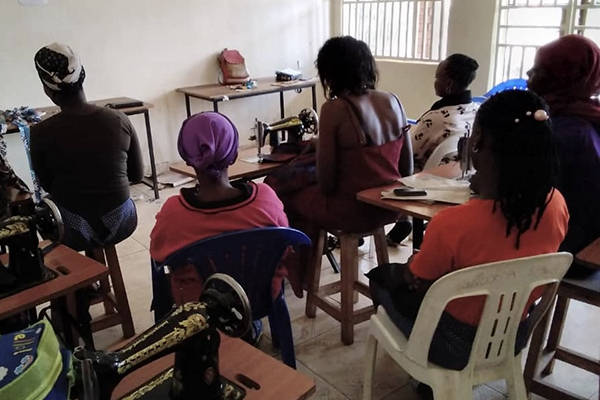
Women in Uganda take part in Magenta Girls Initiative training.
By Jennifer Montgomery, Rotary Peace Fellow and Co-Founder, President and CEO of Magenta Girls Initiative.
Someone wise once said that discomfort is the price of admission for a meaningful life. My experience as a Rotary Peace Fellow has taught me that stepping out of your comfort zone is the only way to live your dream. When you’re gifted this opportunity to be a peace fellow, you have a responsibility to carry the work forward.
“Carrying it forward” motivated me to form Magenta Girls Initiative, an international non-governmental organization equipping Ugandan girls and young women with the support and tools needed to overcome harmful gender norms, generational poverty, Gender-Based Violence (GBV), trafficking, and trauma. For me, it’s also personal. As a survivor of sexual violence, I’m deeply committed to helping others find peace and transformation.
I formed Magenta Girls with Gorett Komurembe, a peace fellow from Uganda, and two Ugandan Rotarian women who are experts on gender and education. Gorett and I have more than 25 years combined experience creating and implementing effective interventions for vulnerable girls and women around the globe. In May, I decided to dedicate myself full time to expanding our new organization. I want to create evidence-based programs that can be implemented in other vulnerable communities in Africa.
At Makerere University
This work began during my year-long Rotary Peace Fellowship in peacebuilding and conflict transformation at Makerere University in Kampala, Uganda. It’s a requirement of the program that each fellow starts or expands on an initiative for positive social change. While visiting an informal urban settlement in Kampala with my fellowship class, I met a group of women working in a brothel. They expressed a strong desire to get out of the brothel and gain education and skills for safer livelihoods. I used my professional expertise and new partnerships gained during the fellowship to create an initiative to empower the women. We worked on resilience building through mindfulness, expressive arts, and leadership training with 70 women. The women were living in extreme poverty and facing pervasive sexual violence, human trafficking, food insecurity, HIV/AIDS, and unsafe housing.

What started as my fellowship project evolved into Magenta Girls Initiative, a nonprofit organization I founded with the help of local Rotarians in Uganda and support from Rotarians in my home state of Kansas. Next came a global grant project between the Uganda Rotary club that hosted me during my fellowship and an international partner in District 6080 in Missouri, USA, as well as support from both international Rotary clubs and clubs in my home district in Kansas.
Magenta Girls empowers at-risk women and girls through training and education, enabling them to work outside of commercial and coercive sex and support themselves and their children in safe and sustainable ways. We provide educational assistance, local mentorship, gender violence crisis response, improved food security, and psychosocial support.
Ubuntu
Through the generosity of a few individual Rotarians, last year we enabled 10 women from the project community to receive training in tailoring and hairdressing. Each one of these determined women overcame serious life challenges to complete the six-month training program and graduate with a professional certificate. Magenta Girls will provide them with funds to start a small business to achieve self-reliance and economic independence.
At Magenta Girls, we’re guided by United Nations Sustainable Development Goals, including lifting women and girls out of poverty and unlocking their potential to be self-sufficient and productive members of their communities.
Ubuntu is the African concept of humaneness: putting yourself out on behalf of others, being vulnerable. It embraces compassion and toughness. It recognizes that my humanity is bound up in yours.
Let’s continue to work together as peace fellows and Rotary members to lead change and build peace through our compassion, action, and shared humanity.
______________
Jennifer is the President and CEO of Magenta Girls Initiative and currently serves as a subject matter expert on human trafficking and Gender Based Violence with the Attorney General Alliance-Africa Programme, Africa Partnership for Justice. She served for 10 years as the director of human trafficking education and outreach for the Kansas Attorney General’s Office and chair of the Kansas Human Trafficking Advisory Board. She’s also a writer and film advisor with Capture Humanity, a collaborative of artists elevating the voices of victims of global human rights abuses.


